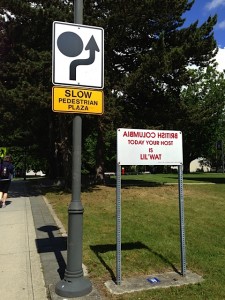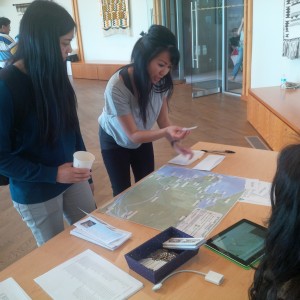After our meeting with Hanae and Michael, we were given some questions to think about. Here are the questions that I have addressed:
1. Do you see your relationship with this place differently after going through the timeline?
Going through this timeline has deepened my understanding of Aboriginal people’s issues and just how intricately entangled those issues are. I did not understand the depth to which their identity was tied up with legal rights. Reading about the measures that the government took in order to limit Aboriginal people’s freedom and basic human rights scared me as well as gave me clarity about how much I, and many others, do not understand of our history. As I said in another blog post, “How do I negotiate between my position as someone who benefits from a system that is based on systematic oppression and a desire to make a positive change for Aboriginal people?” In regards to how I see my relationship with UBC, I have come to understand the importance of acknowledging that I am a guest on

The post on the right has “BRITISH COLUMBIA” on it backwards, and also reads, “TODAY YOUR HOST IS LIL’ WAT.”
Consider the nature of “host” and “guest” relationships.
Musqueam territory. I deeply appreciate that I have the privilege to pursue my studies here, but that appreciation is inevitably counterbalanced with traces of guilt. How could it be otherwise, given the circumstances by which my privilege has been made possible? That being said, as Amy Perreault has discussed with Olivia and myself, we need to move past guilt. I think a starting point is to begin building on the work that people such as Amy, Sarah Ling and others have been working on, even if we only contribute in small ways–a nail hammered in a place where it is needed may be a tiny thing, but an important thing.
2. How does this learning/reflecting process speak to the education you have received?
I do not think that I came out of an education system that does Canadian citizens justice. Most of us do not know the detailed truth about how Canada got to where it is now. Furthermore, by sinister processes, it seems to me that many Canadians have developed a subtle, visceral aversion to knowing the truth about colonialism and the lasting impacts that it has had on a large population of human beings that we share this land with, often casting it off as the “past” and “irrelevant” to current society. This history is not just an Aboriginal issue; it’s a human issue that all Canadians should start thinking about.
3. How do you think the timeline is relevant to your teaching?
As a teacher, and especially one with a focus on elementary school teaching, I think it is my duty to try to make my students see the importance of knowing our history. Having this timeline is brilliant because it enables us to visualize what happened at certain points in time. Also, the timeline helps us begin to insert our own family history into it, thus making it easier to see how everything is connected. As Olivia alluded to in her reflection, what was happening in Canada in the past “made a huge impact” on her ancestors’ descendants.
4. How might you use the timeline in your classroom?
I would have students take the timeline, and investigate what their own families were doing during the significant dates listed. For a point of discussion, perhaps students can then choose a specific date, and answer the question, “How do you think residential schools has has affected your family or yourself? If you don’t think that it has affected you or your family, how do you think it affected Aboriginal families?” “If the government never took away Aboriginal people’s rights, and never sent them to residential schools, what do you think Canada would look like now? How would you fit into that picture of Canada?” Another activity that students could do is to take the perspective of an Aboriginal person, and then do a creative writing project or a drama skit on how that person might have been feeling. A lot of times, we discover understanding (or lack thereof) through students’ creative output. There are many other things that one could do, but I will add to this list at a later time. Depending on the age group, there would be varying degrees of support in how to get certain conversations started, and perhaps even modifying the timeline would be necessary, especially for primary students.







